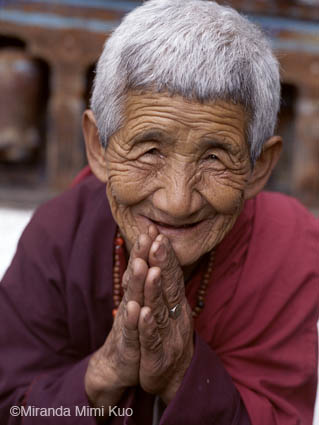 The nun Bidha, in Paro, Bhutan. Playful and content, she suffered enormously in her life, but her smile never revealed this. I photographed her in 2005. The nun Bidha, in Paro, Bhutan. Playful and content, she suffered enormously in her life, but her smile never revealed this. I photographed her in 2005. "In spite of a life devoted to meditation, prayer and books, Brahmagupta was like many other monks I have come to know and admire who are perpetually cheerful, who laugh easily and loudly, the laughter not springing from a sense of humour but from an evolved spirit of mischief and playfulness. Sometimes, watching the frequent and obvious merriment of these monks, I have wondered whether the Buddha's message is indeed about the world being full of pain and sorrow; or perhaps, the Enlightened One has left a secret message for his monks, a cosmic joke which never palls with any number of re-tellings, which makes them laugh so much." -- Sudhir Kakar, The Ascetic of Desire I recently had the pleasure of spending a morning with a three-month old baby. He had just crossed the cusp from expressionless gaze to offering an amused, pleasurable smile at just about anything: holding the baby, I'd look at him and he'd crack up. Turn my head just a little bit? Chuckles and giggles. Widen my eyes, near squeals of joy. It reminded me that at three-months, a human being hasn't had many of the scars of this life set in. Other than crying when tired or grumpy when hungry, few samskaras, or conditioned ways or being, have set in. If there aren't other ailments affecting an infant, the default state seems to be pure and simple joy. This is the state that many Buddhists often describe, and is exemplified by someone such as the Dalai Lama; he is often giggling, laughing, and a self-confessed professional laughter: "I have been confronted with many difficulties throughout the course of my life, and my country is going through a critical period. But I laugh often, and my laughter is contagious. When people ask me how I find the strength to laugh now, I reply that I am a professional laugher. [...]" (excerpt from My Spiritual Journey). In the yoga world, somehow the concept of laughter is less common; few if any of the ancient yogic texts mention the importance of smiling, laughter, or keeping a sense of humour. In part, this is because the ancient texts were collected songs and hymns that offered guidelines to ritual practices or served to recount epic battles and dramatic journeys toward liberation. While beautiful and poetic, they contrast to the the frivolous, often irreverent anecdotes by Zhuangzi, author of one of the early and central texts on Daoism, or the stories from Tibetan Buddhism that celebrate the direly serious and solemn monk who finally opens and awakens by seeing something at which he can't help but laugh. This is not to say, however, that merriment and joy do not have their place on the yoga mat. Though the practice of yoga involves a degree of seriousness, discipline and certainly restraint (the teachings of the yamas offer us excellent examples of restraint), we may actually move closer toward true freedom and away from the conscious or unconscious limitations we face when we meet ourselves with a lightheartedness, and don't take ourselves too seriously. I was reminded of this last weekend, when teaching a level 2-3 class and moving toward a peak of some difficult transitions in arm balances. A few students who attempted the sequence finished by sticking out their tongues and boggling their eyes a bit -- basically having a good laugh. What I saw in them was their joy (pīti) and bliss (sukha) emerge from the states of focus and challenge. These are states described by the Buddha at each stage of his awakening. Perhaps the goal of yoga or any spiritual practice, then, is to remember that beneath the scars of our daily living there is the potential for merriment and laughter. The Buddha teaches us that the root of our suffering is that we forget we are awake, and that mindfulness -- which means "to remember" in Sanskrit (smrti) -- is our pathway back to a conscious presence, a place where we can remember that innate joy. When we do our yoga practice, it's not that we have to finish it and feel happy and cheerful; in fact, most of the time we may be lucky if we simply feel more physically relaxed and guided back to a quieter head space. However, through releasing tension in our physical bodies and perhaps opening some space in our heads, and we start remembering that there are alternatives to the anxious and tired self we may normally carry around and think defines us.
2 Comments
|
AuthorTeacher, writer, lover of movement and meditation who lives with her husband, dog, three cats, 6 chickens and 10,000 bees. Archives
December 2022
Categories
All
|
 RSS Feed
RSS Feed